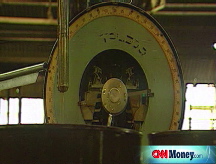Dollar rises sharply on jobs, ECB
Greenback gains back ground after government report on the labor market comes in as-expected, European Central Bank interest rate hike.
NEW YORK (CNNMoney.com) -- The dollar rose against the euro Thursday after a government report on the labor market came in largely as expected despite persistent rumors that a much bleaker number was in store.
The U.S. currency was also supported by hints that the European Central Bank will not hike rates again soon.
The 15-nation euro traded at $1.5698, down from the $1.5888 it bought in late New York trading Wednesday. The euro rose as high $1.5910 just before the ECB announcement.
The British pound bought $1.9820, down from $1.9936 in late New York trading Wednesday. The dollar fetched ¥106.73, up from ¥106.01.
"The positive reaction in the dollar...is largely a reflection of the expectations element rather than a fundamental element," said Ashraf Laidi, Chief Foreign Exchange Strategist at CMC Markets US, in a note to clients.
Laidi continues that the "whisper numbers" circulating in the market just before the report were nearly double what was actually reported.
Jobs: The Labor Department reported a net loss of 62,000 jobs in the month. That matched the job loss figure for May, which was revised higher from 49,000. Economists surveyed by Briefing.com had forecast a loss of 60,000 jobs.
The June number brought to 438,000 the number of jobs lost by the U.S. economy so far this year.
The report also showed that the nation's unemployment rate stayed at 5.5%. Economists had forecast the rate would come in at 5.4% in the latest reading.
While the report still signals weakness in the labor market, the reported numbers were significantly lower than the 100,000 to 125,000 loss that some market participants had expected.
European Central Bank: In a widely expected move, the ECB increased its main interest rate to 4.25% from 4% in an effort to combat mounting inflation. The last time the ECB hiked rates was June 2007.
The announcement came without further comment. But the ECB's president, Jean-Claude Trichet, was set to make a statement later Thursday, which could provide some indication of the ECB's thinking on inflation and the possibility of future rate hikes.
Many economists fear the decision to boost rates in Europe could ultimately bolster the euro and undercut the dollar. That has caused some concern that the ECB's decision will actually fuel inflation in the near term.
The dollar's ongoing decline has been blamed for pushing oil prices higher. Oil is priced in dollars and a weaker greenback brings in overseas buyers and investors looking for a hedge against inflation.
Higher oil and gas prices have contributed to rising inflation rates worldwide.
What's more, the ECB's decision could put pressure on the Federal Reserve to increase interest rates. The Fed held its key fed funds rate at 2% last month, putting an end to an extended rate-cutting campaign. ![]()


